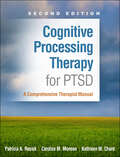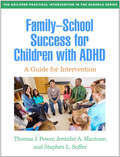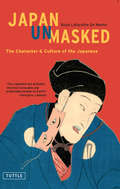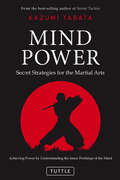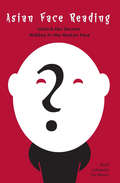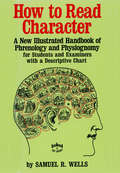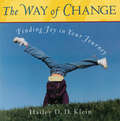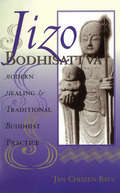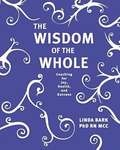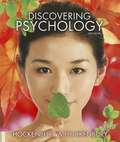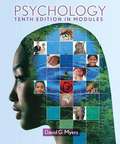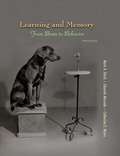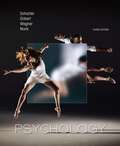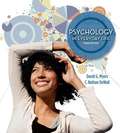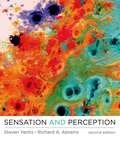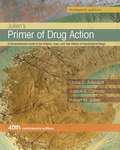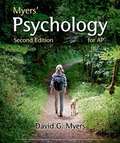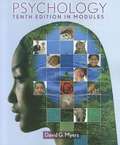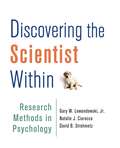- Table View
- List View
Cognitive Processing Therapy for PTSD: A Comprehensive Therapist Manual
by Patricia A. Resick Candice M. Monson Kathleen M. ChardThe authoritative presentation of cognitive processing therapy (CPT) for posttraumatic stress disorder (PTSD) is now in a revised and updated second edition, with an easier-to-use format and a new chapter on conceptualizing treatment. From CPT's developers, the manual includes session-by-session implementation guidelines and extensive sample dialogues. Shaded index tabs in the margins help clinicians quickly navigate to each session. The authors explain the theoretical and empirical underpinnings of CPT and discuss ways to work effectively with specific populations, such as combat veterans, sexual assault survivors, and culturally diverse and LGBTQIA+ clients. Forty-eight reproducible handouts can be photocopied from the large-size book or downloaded from the companion webpage. New to This Edition *Each session now has its own chapter, printed with shaded tabs for easy reference. *Reflects a wealth of new treatment research, conceptual refinements, and feedback from trainings of thousands of clinicians. *Chapter on cognitive case conceptualization. *Discusses additional treatment variations (telehealth, intensive CPT) and client populations (first responders). CPT is endorsed as a best practice for the treatment of PTSD by the U.S. Departments of Veterans Affairs and Defense, the International Society for Traumatic Stress Studies, and the U.K. National Institute for Health and Care Excellence (NICE). See also Getting Unstuck from PTSD, by Patricia A. Resick, Shannon Wiltsey Stirman, and Stefanie T. LoSavio, which presents CPT in a guided self-help format for trauma survivors.
Family-School Success for Children with ADHD: A Guide for Intervention (The Guilford Practical Intervention in the Schools Series)
by Thomas J. Power Jennifer A. Mautone Stephen L. SofferDistilling decades of research, this practical manual presents an innovative intervention for families of 6- to 10-year-olds (grades 1–5) with attention-deficit/hyperactivity disorder (ADHD). Family–School Success (FSS) focuses on improving children's behavior and academic performance by strengthening parent–child, teacher–student, and family–school relationships. Detailed guidelines are provided for implementing FSS with parent groups or individual families, including how to involve children in groups and collaborate with teachers. The authors discuss ways to deliver FSS effectively in school- and clinic-based settings, private practice, and primary care. In a convenient large-size format, the book features dozens of reproducible parent handouts and worksheets, assessment tools, and fidelity checklists, which can also be downloaded and printed. This book is in The Guilford Practical Intervention in the Schools Series, edited by Sandra M. Chafouleas.
Japan Unmasked: The Character & Culture of the Japanese (Tuttle Classics)
by Boye Lafayette De MenteThe growing globalization of world business, culture and communication--and Japan's increasingly important role as a leader in that world--makes understanding Japanese culture critical for business people, diplomats, students, educators and anyone else with an interest in Japan.<P><P>Westerners have recognized--and analyzed--the many unique aspects of Japanese culture since they first set foot in Japan in the 16th century. The special talents (and weaknesses) that characterize the Japanese way of life are by now well-documented. But few Westerners really understand the beliefs and values that underlie how the Japanese think and act, how and why these attributes have been preserved in Japanese culture from ancient times through the modern day, or the critical role they play in today's Japanese society.In Japan Unmasked veteran Japanologist and author Boye Lafayette De Mente explores the social, cultural, and psychological characteristics responsible for the unique nature of modern-day Japanese culture-- the real "face" behind the "mask"--and demonstrates how they have brought the Japanese to their central role on the world stage.
Mind Power
by Kazumi Tabata Kaiichi HasumiLife is full of adversities. There comes a time when education, social status, fame, fortune, and even family ties all become useless. At a decisive moment like this, the ability to focus one's entire being--to harness one's total spiritual and mental energy--is required for survival and success. In this book, Master Kazumi Tabata shares his knowledge in how to achieve this goal.When beginning any martial arts discipline, students study physical techniques. Only after much time and intense practice do these techniques become second nature. Yet there is a higher level where you feel at one with yourself, your opponent, and with the world around you . Your opponent moves in slow motion, whereas you move without thought, and you become unbeatable.In Mind Power: Secret Strategies for the Martial Arts, Kazumi Tabata, Grandmaster in the Shotokan and Shorinji styles of Karate, offers his personal teachings as to how martial arts students can reach the point where time seems to slow down, quick movements are seen in slow motion, and the full potential of one's inner power can be harnessed.Chapters Include:StrategyBasic Laws of the Body and MindStrategy of a Virtuous ManHow to Interpert Your Mind
Mind Power
by Kazumi Tabata Kaiichi HasumiAt the earliest stages of learning a martial art, students almost exclusively study the physical techniques. It is only after much time and intensive practice that these techniques become automatic. Reaching the point of ingrained movements is a major step in mastering a martial art. Yet when the practitioner learns to become one with himself, the opponent and with nature itself, when the opponent's moves appear as if in slow motion, the practitioner moves without thought and becomes unbeatable.In Mind Power, Master Kazumi Tabata, Grand Master in the Shotokan and Shorinji styles of Karate, offers his personal teachings as to how martial arts students can reach the point where time seems to slow down, quick movements are seen in slow motion, and the full potential of one's inner power can be harnessed.
Mind Power
by Kazumi Tabata Kaiichi HasumiAt the earliest stages of learning a martial art, students almost exclusively study the physical techniques. It is only after much time and intensive practice that these techniques become automatic. Reaching the point of ingrained movements is a major step in mastering a martial art. Yet when the practitioner learns to become one with himself, the opponent and with nature itself, when the opponent's moves appear as if in slow motion, the practitioner moves without thought and becomes unbeatable.In Mind Power, Master Kazumi Tabata, Grand Master in the Shotokan and Shorinji styles of Karate, offers his personal teachings as to how martial arts students can reach the point where time seems to slow down, quick movements are seen in slow motion, and the full potential of one's inner power can be harnessed.
Asian Face Reading
by Boye Lafayette De MenteImagine how much you could learn if you knew how to evaluate a person's character, health, fortune, social status, sexual charisma, and life expectancy from a careful reading of his or her face. <P><P> In China and Japan, face reading is a respectable analytical tool used to make business decisions, arrange marriages, and evaluate partnerships and friendships. Asian Face Reading offers a quick, practical, easy-to-understand and easy-to-apply introduction to the basic principles of face reading. The book is fully illustrated with dozens of examples readers can use to learn this increasingly popular practice-and to analyze their friends, colleagues, and loved ones.
How to Read Character
by Samuel R. WellsHere is a book with a lot of character-in fact, many characters, some famous and others infamous, from misers and murderers to presidents, philosophers and plenipotentiaries. These many and varied personalities are presented as illustrations of character traits.Certainly a new audience of readers will find many things in the book to enjoy and to ponder as well.
The Way of Change
by Hailey D. D. KleinHailey Klein's system for change is different from most of those based on visualisation because you don't begin with what you want: in order to access the energy around you, you begin with what is. Klein's simple three-step programme includes: Stage 1 - Separation/Awareness/Understanding; Stage 2 - Intention/Truth/Acceptance; Stage 3 - Action/Change/Momentum.
Jizo Bodhisattva
by Jan Chozen BaysJizo Bodhisattva is an important saint of the Mahayana Buddhist tradition, and is most prominent in Japanese Zen Buddhism. This book helps readers understand how this Buddhist saint of travellers, children and the dead can help people confront suffering. Accompanied with beautiful black and white photographs and illustrations, Bays writes for those who are grieving, those who have lost loved ones, or anyone with an interest in Buddhism or Zen.
The Wisdom of the Whole: Coaching for Joy, Health, and Success
by Linda Bark<p>Learn all about holistic/integral coaching! If you are a professional who helps others to lead flourishing, happier lives, this book will help you become even more effective. If you are interested in learning about effective change for yourself, this book is also for you because of its fun and easy design, playful illustrations, and interactive exercises. <p>The Wisdom of the Whole invites people to look through multiple windows for exploration and action. The powerful mental tools described in this book are based on critical thinking, analysis, and planning. But we can’t stop there! The stories clients tell themselves as well as techniques such as imagery and affirmations, can help clients travel forward on a path to their goals. Ways for coaches and clients to employ intuition and the more subtle aspects of being add to the complete approach. Finding out how sense of purpose can impact motivation or shape an aspiration is also part of this model described here. The multidimensional approach enables people to move more quickly and easily toward their goals with greater authenticity, often eliminating false starts or wrong turns.
Discovering Psychology 6th Edition
by Don Hockenbury Sandra E. HockenburyAn introductory Psychology text.
Psychology
by David G. MyersThis modules-based version of Myers' Psychology tenth edition breaks down the book's 16 chapters into 54 short modules. The condensed text allows students to better grasp and explore psychological concepts. It also makes for more flexibility in teaching, as cross-references to other chapters have been replaced with brief explanations.
Learning and Memory
by Catherine E. Myers Eduardo Mercado Mark A. GluckWith its modular organization, consistent chapter structure, and contemporary perspective, this groundbreaking survey is ideal for courses on learning and memory, and is easily adaptable to courses that focus on either learning or memory. Instructors can assign the chapters they want from four distinctive modules (introduction, learning, memory, and integrative topics), with each chapter addressing behavioral processes, then the underlying neuroscience, then relevant clinical perspectives. The book is further distinguished by its full-color presentation and coverage that includes comparisons between studies of human and nonhuman brains. The new edition offers enhanced pedagogy and more coverage of animal learning.
Psychology (Third Edition)
by Daniel L. Schacter Daniel T. Gilbert Daniel M. Wegner Matthew K. NockStudents rarely look at a psychology textbook after leaving college, but they will continue to encounter psychology throughout their lives. With that in mind, renowned authors and researchers Schacter, Gilbert, Wegner, and now Matthew Nock introduce students to today's research with a focus on the critical thinking skills that will stay with them beyond the course term. Quirky examples of thinking gone awry, and scenarios based on common psychological misconceptions are just some of the tools the authors use to get students to question what they think they know about psychological science.
Fundamentals of Abnormal Psychology Student Workbook
by Ronald J. Comer Gregory P. ComerStudent Workbook for Ronald J. Comer's Fundamentals of Abnormal Psychology SEVENTH EDITION
Exploring Psychology in Modules (Ninth Edition)
by David G. Myers C. Nathan DewallIn this ninth edition, the unwavering vision for Exploring Psychology is to merge rigorous science with a broad human perspective that engages both mind and heart.
Psychology in Everyday Life, Third Edition
by David G. Myers C. Nathan DewallDavid Myers' Psychology in Everyday Life speaks to all students regardless of their background or level of preparedness, with no assumptions made in the vocabulary, examples, or presentation.
Sensation and Perception
by Richard A. Abrams Steven YantisLike no other text, Sensation and Perception expertly introduces students to how we sense and perceive the world around us. Using clear and detailed explanations and highly effective illustrations the text illuminates the connections between mind, brain, and behavior in the realm of sensation and perception. Seamlessly integrating classic findings with cutting edge research in psychology, physiology and neuroscience Sensation and Perception 2e explores what questions researchers are seeking to answer to today and the methods of investigation they are using.Sensation and Perception, Second Edition, now includes 15 chapters, including separate chapters on motion perception, perception for action, olfaction, and gustation, and a new appendix on noise and signal detection theory The new edition introduces new coauthor Richard A. Abrams (Washington University).
Julien's Primer of Drug Action
by Claire D. Advokat Robert M. Julien Joseph E. ComatyIn its 40th anniversary edition, A Primer of Drug Action continues to evolve side by side with the field it covers, drawing on the expertise of its authors in medicine, basic science, and clinical science to offer the most current and comprehensive guide to psychopharmacology available.
Myers' Psychology for AP (Second Edition)
by David G. MyersWith an undeniable gift for writing, Dr. Myers will lead your students on a guided tour of psychological science and poignant personal stories. Dr. Myers teaches, illuminates, and inspires.Four years ago, we published this ground-breaking text which is correlated directly to the AP® course. Today, we build on that innovation and proudly introduce the 2nd AP® Edition. Whether you are new to AP® psychology or have many years under your belt, this uniquely AP® book program can help you achieve more.
Myers' Psychology for AP®
by David G. MyersThus begins market-leading author David Myers’ discussion of developmental psychology in Unit 9 of his new Myers’ Psychology for AP® Second Edition. With an undeniable gift for writing, Dr. Myers will lead your students on a guided tour of psychological science and poignant personal stories. Dr. Myers teaches, illuminates, and inspires. Four years ago, we published this ground-breaking text which is correlated directly to the AP® course. Today, we build on that innovation and proudly introduce the 2nd AP® Edition. Whether you are new to AP® psychology or have many years under your belt, this uniquely AP® book program can help you achieve more.
Psychology: In Modules (Tenth Edition)
by David G. MyersThis modules-based version of Myers' Psychology tenth edition breaks down the book's 16 chapters into 54 short modules. The condensed text allows students to better grasp and explore psychological concepts. It also makes for more flexibility in teaching, as cross-references to other chapters have been replaced with brief explanations.
Discovering the Scientist Within Research Methods in Psychology
by Gary W. Lewandowski Natalie J. Ciarocco David B. StrohmetzIn this breakthrough first edition, authors Gary Lewandowski, Natalie Ciarocco, and David Strohmetz draw on their extensive classroom experiences to introduce research methodology in a highly effective, thoroughly engaging new way, maximizing students’ familiarity with every step of the process. For the first time in a methods text, each design chapter follows a single study from ideation to writing for publication, with students researching an intriguing question emerging from a chapter-long case study. Also for the first time in a methods text, each design chapter models the entire research process, so students get multiple opportunities to experience that process start to finish.
Learning and Memory: From Brain to Behavior (Second Edition)
by Mark A. Gluck Eduardo Mercado Catherine E. MyersDevelopments in neuroscience have changed the field of learning and memory significantly in the last ten years. This comprehensive introduction to learning and memory covers behavioural processes, brain systems, and clinical perspectives.
